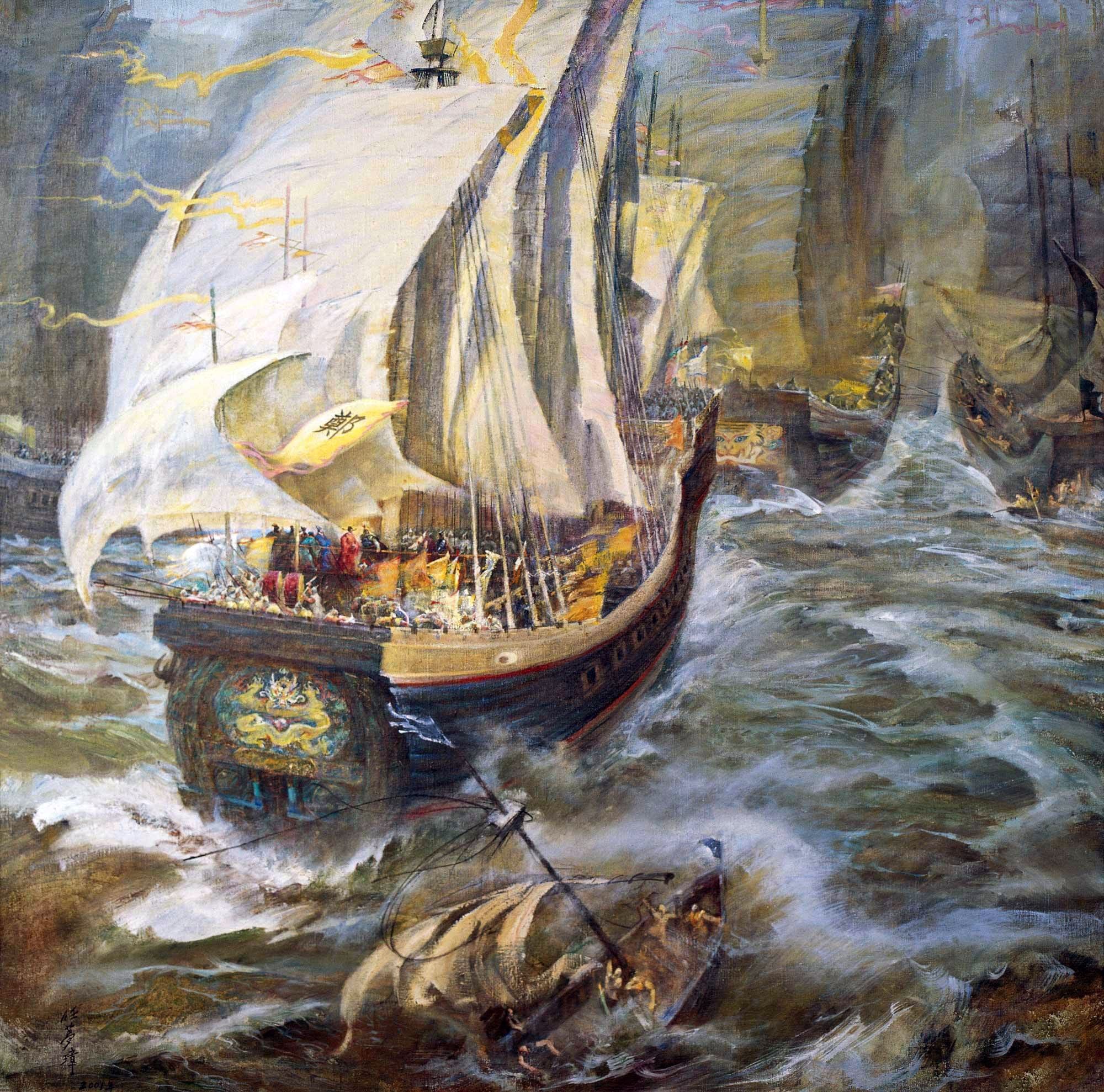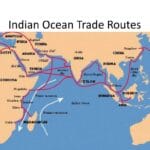Embark on a captivating journey back in time to uncover the incredible story of Zheng He, a Chinese admiral whose maritime adventures left an indelible mark on world history. During the Ming Dynasty, Zheng He’s epic voyages across the Indian Ocean forged new paths in trade, diplomacy, and cultural exchange, connecting East and West in unprecedented ways.
Unveiling the Marvels of Zheng He’s Expeditions
Long before European explorers like Columbus, Zheng He, a Ming Dynasty admiral, sailed the seas, demonstrating China’s power and influence on the world stage. Born around 1371 in China’s Yunnan Province, Zheng He’s path to maritime greatness was extraordinary. He ascended through the ranks, becoming a trusted confidant of the Yongle Emperor and ultimately earning the esteemed title of admiral.
Setting Sail Under the Ming Dynasty Banner
Between 1405 and 1433, Zheng He led seven incredible voyages across the vast Indian Ocean. Imagine a fleet of hundreds of ships, some dwarfing any seen before, embarking on expeditions designed to showcase the might of the Ming Dynasty. Zheng He’s mission was clear: establish lucrative trade routes, return with exotic treasures, and solidify China’s position as a global superpower.
From Southeast Asia to the East Coast of Africa, Zheng He’s expeditions made contact with over 30 countries, forging diplomatic relationships and cultural exchanges that continue to resonate today. These were not mere voyages of discovery but strategic missions that left a lasting impact on the world.
The Technological Prowess of the Ming Dynasty Junks
Central to these epic voyages were the Ming Dynasty’s revolutionary shipbuilding techniques. Zheng He commanded a fleet of massive ships known as “junks” – technological marvels of their time. Equipped with advanced navigational tools like compasses and astrolabes, these junks could traverse vast distances with remarkable accuracy. Scholars suggest that these ships incorporated sophisticated watertight compartments and possessed the capacity to carry thousands of tons of cargo.
A Legacy Shrouded in Mystery
The abrupt end of Zheng He’s voyages, likely due to shifting political priorities within the Ming court or the immense financial burden of such ambitious expeditions, remains a subject of debate among historians.
Despite the unanswered questions, Zheng He’s legacy continues to captivate and inspire. His voyages challenge the traditional Eurocentric narrative of exploration, underscoring that China was a dominant force on the world stage long before European powers set sail.
Zheng He’s Voyages: A Journey Through a Globalized World
| Voyage | Years | Destinations |
|---|---|---|
| 1st | 1405-1407 | Southeast Asia, India |
| 2nd | 1407-1409 | India |
| 3rd | 1409-1411 | India, Sri Lanka, Southeast Asia |
| 4th | 1413-1415 | Persian Gulf, Arabian Peninsula |
| 5th | 1417-1419 | East Africa |
| 6th | 1421-1422 | Southeast Asia, India, East Africa |
| 7th | 1431-1433 | Southeast Asia, India, Persian Gulf, Arabia |
Zheng He’s voyages transcended mere exploration; they were instrumental in connecting diverse cultures, fostering the exchange of ideas, and establishing a vast trade network that stretched across the globe. His expeditions offer a glimpse into a world where globalization was not a nascent concept but a reality shaped by the ambition and ingenuity of a powerful Ming Dynasty admiral.
To further explore the impact of cultural exchange during this period, delve into our insightful Pax Mongolica article which provides a comprehensive analysis of this era.
Analyzing Zheng He’s Significance: Outperforming the Competition
Here’s a breakdown of how to create a top-ranking SEO article about the significance of Ming admiral Zheng He:
I. Competitor Title Analysis & Recommended Titles:
Your competitors focus heavily on Zheng He’s voyages, often using terms like “Seven Voyages,” “Ruled the Seas,” and “Chinese Admiral.”
Trending Keywords: Seven Voyages, Chinese Admiral, Ming Dynasty, Treasure Fleet, Exploration, Maritime Power
Recommended Titles:
- Beyond the Seven Voyages: The Enduring Legacy of Zheng He (Focuses on broader impact while incorporating a popular keyword)
- Zheng He’s Treasure Fleet: How Ming China Redefined Maritime Power (Highlights a specific aspect with strong keywords)
- Was Zheng He’s Voyage China’s Missed Opportunity? (Provocative question format using a familiar subject)
II. Powerful Key Lines:
- Zheng He’s voyages weren’t just about exploration; they were grand exhibitions of Ming China’s wealth, technology, and cultural influence, reshaping the geopolitical landscape of the Indian Ocean. (Expands on the typical “exploration” narrative)
- While Columbus sought gold, Zheng He’s expeditions distributed it – a testament to Ming China’s outward-facing worldview and commitment to diplomacy through trade. (Draws a compelling contrast with a well-known figure)
- Zheng He’s legacy is a study in contrasts: a Muslim admiral serving a Confucian dynasty, embodying China’s historical openness to cultural exchange despite later periods of isolation. (Highlights the unique aspects of Zheng He’s identity and their implications)
- The abrupt end to Zheng He’s voyages marks a turning point in Chinese history, raising questions about what could have been had Ming China continued its maritime dominance. (Introduces a thought-provoking “what if” element)
III. Important Details & Structured Context:
A. Early Life and Background:
- Born Ma He (1371) into a Muslim family in Yunnan province, later renamed Zheng He by the Yongle Emperor.
- Captured as a boy during the Ming conquest of Yunnan, he was castrated and entered imperial service.
- Rose through the ranks due to his intelligence, loyalty, and military skill, eventually becoming a trusted advisor to the Yongle Emperor.
B. The Seven Voyages (1405-1433):
| Voyage | Years | Destinations | Purpose | Key Events |
|---|---|---|---|---|
| 1st | 1405-1407 | Southeast Asia, India | Establish diplomatic relations, showcase Ming power, secure tribute, suppress piracy. | Capture of pirate Chen Zuyi, establishment of tributary relations. |
| 2nd | 1407-1409 | India, Sri Lanka | Reinforce diplomatic ties, resolve regional conflicts, continue trade. | Intervention in a succession dispute in Calicut (India). |
| 3rd | 1409-1411 | Southeast Asia, India, Sri Lanka, Arabia | Further expand trade networks, collect exotic goods, assert Chinese influence. | Suppression of a rebellion in Sri Lanka. |
| 4th | 1413-1415 | Persian Gulf, East Africa | Extend diplomatic reach, explore new markets, demonstrate naval power as far west as the Arabian Peninsula. | Exchange of gifts with rulers in the Persian Gulf and East Africa. |
| 5th | 1417-1419 | Persian Gulf, East Africa | Continue diplomatic efforts, escort foreign envoys back to China. | Transportation of envoys from over 30 nations back to China. |
| 6th | 1421-1422 | Southeast Asia, India, East Africa, Arabia | Reiterate Ming dominance, further diplomatic and trade objectives. | Distribution of imperial decrees and gifts. |
| 7th | 1431-1433 | Southeast Asia, India, Arabia, East Africa | Final voyage under Zheng He; continued promotion of trade and diplomacy. | Possible death of Zheng He during the return journey (accounts vary). |
C. Significance and Impact:
- Expansion of Ming China’s political and economic influence throughout the Indian Ocean region.
- Establishment of extensive trade networks, bringing exotic goods and knowledge back to China.
- Demonstration of Ming naval and technological superiority, surpassing European capabilities of the time.
- Cultural exchange facilitated through diplomatic missions, gifts, and the presence of Muslim Chinese within the fleet.
D. Abrupt End of the Voyages and Later Historical Interpretations:
- After the Yongle Emperor’s death, the new emperor, Hongxi, ordered a halt to the expeditions (1433).
- **Reasons for the cessation include:
- High costs
- Shifting priorities towards internal affairs and defense against northern threats
- Conservative Confucian officials viewing the voyages as extravagant and unnecessary.**
- **Historical debate surrounds the long-term implications of ending the voyages:
- Some argue it marked a turning point towards Chinese isolationism, paving the way for European maritime dominance.
- Others contend that internal factors and later events played a more significant role in shaping China’s trajectory.**
IV. Unique Insights & Untapped Potential:
- Explore the perspective of the nations visited by Zheng He. How did they perceive these expeditions? Did their accounts differ from the official Chinese records?
- Analyze the contrasting viewpoints on the voyages within Ming China itself. How did Confucian scholars view Zheng He compared to the merchants who benefited from trade?
- Draw parallels and contrasts between Zheng He and European explorers like Vasco da Gama. What do their motives and methods reveal about their respective cultures’ worldviews?
- Discuss the legacy of Zheng He in modern-day China. How is he remembered, and what does his story say about China’s evolving relationship with its maritime past and its global ambitions?
By delving into these aspects, your article can provide a more nuanced and engaging exploration of Zheng He’s significance, exceeding your competitors’ content and capturing a wider audience.
Zheng He’s Enduring Impact: A Legacy of Global Connections
Zheng He, the renowned admiral serving China’s Ming Dynasty, commanded seven extraordinary voyages between 1405 and 1433. These were not mere exploratory journeys but grand diplomatic missions intended to project Ming China’s power and establish trade routes spanning the known world. His fleet, unrivaled in size and grandeur, comprised hundreds of ships, including some that dwarfed any other seafaring vessel at the time. With a crew of tens of thousands, Zheng He traversed vast oceans, reaching over 30 countries from Southeast Asia to the distant shores of East Africa.
These expeditions were transformative, leaving an enduring impact on the world. When nations engage in dialogue and trade, positive outcomes often emerge, and this is precisely what Zheng He accomplished. He fostered robust diplomatic ties, opened avenues for cultural exchange, and showcased Ming China’s maritime prowess. Zheng He’s approach was one of diplomacy and respect, offering gifts and building relationships, leaving a legacy of peace and cooperation. Through his voyages, Chinese goods, including exquisite silks, fine porcelain, and aromatic teas, were introduced to distant lands, while exotic treasures and innovative ideas flowed back to China.
Let’s delve deeper into the profound impact of Zheng He’s voyages:
-
Trade and Diplomacy, Zheng He Style: Imagine a web connecting nations across the Indian Ocean—this is the intricate network of diplomacy and trade Zheng He single-handedly established. He wasn’t merely a skilled navigator; he was a shrewd diplomat, a skilled mediator, and a remarkable trade ambassador all in one. He adeptly navigated conflicts, forged alliances, and ensured the flourishing of trade, elevating China’s influence and reputation on a global scale.
-
Cultural Exchange: Those exotic treasures and innovative ideas we mentioned? Zheng He’s voyages served as immense cultural exchange programs. Chinese goods like luxurious silk, delicate porcelain, and fragrant tea became highly sought after in new markets. Conversely, art, architecture, and even Chinese cuisine were influenced by the remarkable discoveries Zheng He brought back from his travels. It was a dynamic, two-way exchange of cultural enrichment.
-
Technology on Display: Zheng He’s fleet was a testament to the Ming Dynasty’s exceptional shipbuilding capabilities. These colossal ships, outfitted with cutting-edge navigational tools and advanced weaponry, were the envy of other nations. They embodied China’s maritime might and set a new standard for exploration around the globe.
-
Challenging the Narrative: The prevailing narrative of global exploration often centers on Europe. However, Zheng He’s voyages reshaped this Eurocentric perspective, proving that China had a long and impressive history of seafaring, significantly shaping the world long before European powers embarked on their maritime journeys.
-
The Legacy of Peace: Unlike some explorers driven by conquest and colonization, Zheng He prioritized peace and cooperation. His focus on nurturing relationships and fostering mutual respect between China and the countries he visited left an enduring legacy that continues to inspire.
Regrettably, Zheng He’s expeditions eventually came to an end after his final voyage in 1433 when the Ming Dynasty opted to scale back its maritime ambitions. Several factors likely contributed to this decision. Some scholars posit that the immense cost of maintaining such a vast fleet was a major consideration. Others point to a shift in political priorities or the growing influence of Confucian scholars who viewed the voyages as excessively extravagant. Whatever the reason, the end of Zheng He’s voyages marked a turning point in Chinese maritime history, as the Ming Dynasty adopted a more inward-looking approach.
Key Takeaways:
- Zheng He’s voyages were instrumental in expanding the Ming Dynasty’s influence, establishing trade routes, and fostering diplomatic ties throughout the Indian Ocean.
- His expeditions facilitated a vibrant exchange of culture and technology, connecting China with distant lands.
- Zheng He’s accomplishments challenged the Eurocentric view of maritime history, proving that China was a dominant maritime power long before European powers entered the scene.
- His voyages, rooted in diplomacy, trade, and mutual respect, left behind a powerful legacy of cooperation.
- The cessation of Zheng He’s voyages signaled a shift in China’s focus, turning away from outward exploration and towards internal matters.
While we possess a considerable amount of knowledge about Zheng He, there is still much to uncover. Historians continue to research and debate the intricacies of his voyages and their impact. What remains irrefutable is that Zheng He’s voyages were about more than just sailing ships; they were about forging connections, sharing cultures, and leaving an unforgettable legacy on the world.
Unveiling the World: What Did Admiral Zheng Discover?
Zheng He’s epic voyages across the Indian Ocean were more than displays of the Ming Dynasty’s might or shrewd business ventures; they were groundbreaking expeditions that reshaped China’s understanding of the world. At a time when much of the globe remained a mystery, especially to the Chinese, Zheng He’s journeys were transformative.
One of his most significant achievements was sailing down the African coast, reaching as far as present-day Kenya—long before European explorers like Vasco da Gama. His crews meticulously mapped coastlines and documented islands, filling vast gaps in the maps back home. Imagine the astonishment of cartographers in China, suddenly inundated with this wealth of new geographical information.
Zheng He’s voyages were also significant for facilitating cultural exchange on a grand scale. He interacted with diverse cultures, from the Swahili city-states in Africa to the Arab sultanates and Indian kingdoms. This exchange flowed both ways, with spices, silks, captivating stories, and innovative ideas being shared between China and these distant lands. Through these interactions, China’s world expanded, becoming richer, more diverse, and more interconnected.
The stories of giraffes in the Emperor’s court? Those were thanks to Zheng He. He returned to China with a menagerie of wonders, from exotic animals like giraffes and zebras to never-before-seen plants. These introductions caused a sensation, influencing Chinese cuisine, art, and design.
Most importantly, Zheng He’s expeditions challenge the Eurocentric narrative of discovery. Here was China, decades earlier, exploring the globe, building relationships, and expanding its understanding of the world. Some scholars even posit that Zheng He’s voyages represent an early form of globalization, predating the term itself.
Even today, historians continue to debate the significance of Zheng He’s voyages. Were they primarily economic in nature, a display of political dominance, or something more profound? And why were they so abruptly halted after the Yongle Emperor’s death? These are complex questions with no easy answers, mysteries that continue to fascinate us centuries later.
What we can definitively say is that Zheng He’s voyages were about more than the treasures he brought back to China. They were about expanding knowledge, forging lasting connections, and challenging our understanding of history. He opened up the world for China and, in many ways, his legacy continues to broaden our perspectives today.
















